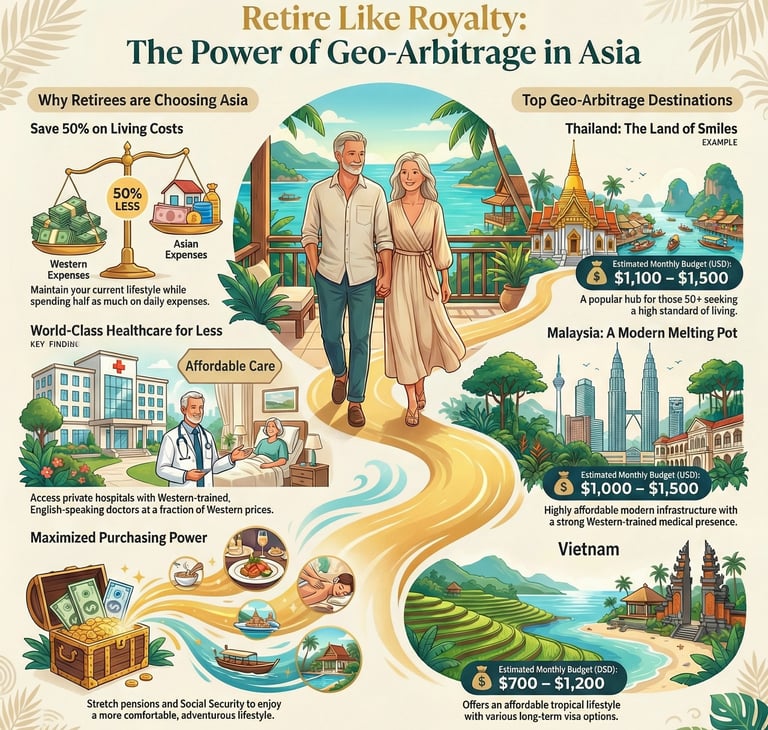Check requirements for Asia's Retirement Visas
What is Geo-Arbitrage: Unlocking a Richer Life for Retirees in Asia
How would you like to wake up every morning, to the tune of saving 50% of you living cost, yet enjoy the same healthcare (or better), good food (or even better) and wellness perks of your home country?
Not only are Westerners from USA, UK, Germany, Canada, Australia seeking greener pastures abroad but even within a region such as Japanese and Koreans moving to Malaysia and Thailand, Hong Kong and Macau moving to China and Singaporeans moving to Malaysia.
Welcome to the new world of retirees embracing geo-arbitrage – a strategic financial move that involves relocating to a country where the cost of living is significantly lower than where your income originates. Imagine stretching your pension, investments, or remote earnings further, enjoying a higher quality of life, and experiencing new cultures, all while potentially extending your retirement savings.
Asia, with its diverse landscapes, rich cultures, and remarkably affordable living, has emerged as a prime destination for retirees looking to leverage geo-arbitrage.
What is Geo-Arbitrage?
At its core, geo-arbitrage is about maximizing your purchasing power by moving from a high-cost-of-living area to a lower-cost one, while maintaining your income level. For retirees, this income might come from:
Pensions
Social Security or other government benefits
Investment dividends
Rental income from properties back home
Part-time remote work or consulting
The goal is to create a significant "arbitrage gap" – the difference in living costs that allows your money to go much further, enabling a more comfortable, adventurous, or even earlier retirement.
Why Asia for Geo-Arbitrage?
Asia offers a compelling combination of factors that make it incredibly attractive for retirees:
Significantly Lower Cost of Living: This is the primary driver. Housing, food, transportation, and daily expenses can be a fraction of what they are in many Western countries.
High Quality of Life: Many Asian cities and towns offer modern amenities, excellent infrastructure, vibrant cultural scenes, and access to beautiful natural environments.
Affordable, High-Quality Healthcare: Private healthcare systems in many Asian countries are world-class, with highly trained doctors (often English-speaking) and state-of-the-art facilities, all at a fraction of Western prices.
Rich Cultural Experiences: From ancient temples to bustling markets, diverse cuisines to serene landscapes, Asia provides endless opportunities for cultural immersion and exploration.
Warm Climates: Many popular destinations boast pleasant, tropical climates, appealing to those looking to escape harsh winters.
Welcoming Communities: Expats and retirees often find warm, welcoming communities, both local and international.
Top Asian Countries for Retiree Geo-Arbitrage
Let's explore some popular choices for retirees in Asia, considering their unique offerings:
1. Thailand: The Land of Smiles
Cost of Living: Very affordable. A comfortable lifestyle can be achieved on $1,100 - $1,500 USD per month for an individual. Bangkok and Chiang Mai are popular hubs.
Healthcare: Excellent private hospitals, especially in major cities like Bangkok and Chiang Mai, with English-speaking staff and high standards of care. Medical tourism is a thriving industry.
Visa Considerations: The "Non-Immigrant O-A (Long Stay)" visa is popular for retirees aged 50+, requiring proof of financial stability (e.g., a deposit of THB 800,000 in a Thai bank account or a monthly income of THB 65,000).
Check out the best way to ease into retirement in Thailand: Retiring in Thailand: Should I Ease In or Go Big Bang?
2. Malaysia: A Modern Melting Pot
Cost of Living: Highly affordable, especially outside of Kuala Lumpur's immediate city center. A monthly budget of $1,000 - $1,500 USD can provide a good quality of life. Find out how much it takes to retire in Kuala Lumpur: Is Kuala Lumpur a Good Place to Retire? The Pros, Cons, and Cost Breakdown for Seniors
Healthcare: High-quality private healthcare, particularly in major cities like Kuala Lumpur and Penang. Many doctors are Western-trained and fluent in English.
Visa Considerations: The "Malaysia My Second Home (MM2H)" program was a popular long-term visa, though its requirements have become stricter. Other options like a retirement visa (if applicable to your nationality) or long-term social visit passes may be explored.
3. Indonesia (Bali): Island Paradise
Cost of Living: Bali offers a very affordable lifestyle, with a comfortable budget ranging from $800 - $1,500 USD per month, depending on location and lifestyle choices.
Healthcare: Quality private hospitals are available, especially in tourist areas like Denpasar. For very complex procedures, some expats may travel to Singapore or Thailand.
Visa Considerations: Indonesia has been developing various long-term visas, including a "Second Home Visa" for those with significant funds, and more recently, a "Digital Nomad Visa" which might appeal to those still working remotely.
4. Vietnam: Vibrant Culture and Emerging Opportunities
Cost of Living: Extremely low. A monthly budget of $700 - $1,200 USD can afford a very good lifestyle in cities like Hoi An, Da Nang, or Hanoi.
Healthcare: Healthcare quality is improving, with modern private clinics and hospitals in major cities. For serious conditions, medical evacuation or travel to neighboring countries might be considered by some.
Visa Considerations: Long-term visas for retirees are less straightforward than in Thailand or Malaysia, often requiring ongoing visa runs or specific business/investment visas.
Check out popular Vietnam retirement cities: Da Nang, Vietnam: Popular Geo-Arbitrage Haven for Retirement & Remote Work
5. India: Spiritual and Diverse
Cost of Living: Among the lowest in Asia. A budget of $500 - $1,000 USD per month can offer a comfortable life, especially outside of major metropolitan areas.
Healthcare: Varies significantly. Major cities have excellent private hospitals with highly skilled doctors, often at very low costs. Rural areas may have limited facilities.
Visa Considerations: India does not have a specific retirement visa. Long-term stays typically involve a standard tourist visa (which requires leaving and re-entering the country), or other visa categories if eligible.
6. Sri Lanka: Island Charm and Wellness Focus
Cost of Living: Relatively low, with a comfortable monthly budget around $800 - $1,200 USD.
Healthcare: Quality private hospitals are available in Colombo and other main cities. Known for its traditional Ayurvedic medicine.
Visa Considerations: Sri Lanka offers a "My Dream Home" visa program for retirees over 55, requiring a financial deposit.
Key Considerations for Geo-Arbitrage
While the benefits are compelling, successful geo-arbitrage requires careful planning. See our geo-arbitrate Asia retirement planner: 2026 Retirement Resolution: Step-by-Step Guide to Retire in Asia's by 2027
Visa & Residency: Research long-term visa options thoroughly. Requirements vary widely and can change. Go to our long term portal visa research portal: https://www.eatruntravelretire.com/asias-visa-checker
Healthcare & Insurance: Understand the local healthcare system. While private care is affordable, consider international health insurance for comprehensive coverage or emergencies.
Taxes: Consult with a tax professional in both your home country and your potential new country to understand tax implications.
Banking & Finance: Set up international banking solutions and understand currency exchange rates.
Social Connection: Plan how you'll build a new social circle and maintain connections with family and friends back home. Oh, and internet connect must be good too!
Language & Culture: While English is widely spoken in expat communities and private hospitals, learning some local language phrases can greatly enhance your experience.
Trial Period: Consider a long-term visit (e.g., 1-3 months) before making a permanent move to ensure the location is a good fit.
Geo-arbitrage in Asia offers a compelling pathway to a more fulfilling, adventurous, and financially sustainable retirement. With careful research and an open mind, you can unlock a truly richer life abroad.
Contact us if you need to discuss about geo-arbitrate retirement to a lower cost city or country in Asia.
Disclaimer: This article is for informational purposes only and does not constitute professional advice. Consult with an immigration specialist, financial advisor, or legal counsel before making decisions about relocating or investing abroad.




Address
Blk 8 Cantonment Close
SIngapore